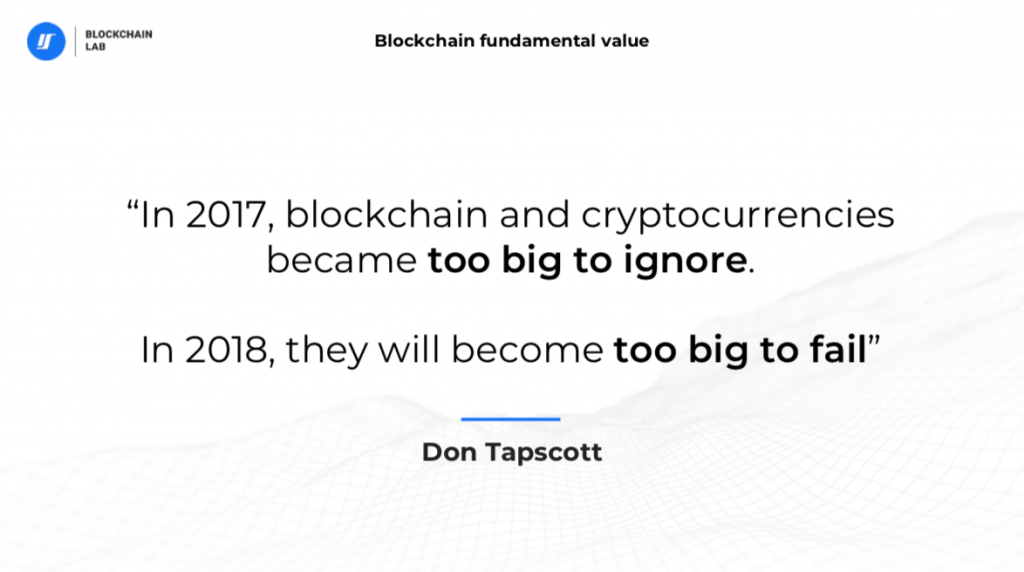
How the Consortium Blockchain Works
September 25, 2019
Corda and Real Businesses Built on Top of This Framework
August 23, 2019
In our previous post we reviewed blockchain projects that possess a solid business model. In fact, enterprises often require implementation of blockchain as part of their processes. In this article we will make a general overview of use cases and describe how to implement blockchain on a corporate level. It will mark the beginning of a series of posts on this topic.
Distributed ledger solutions are capable of bridging the enterprise security gap, granting efficiency and bringing transparency. That is a lot of ground to cover, where should we start?

We can’t stress enough the fact that not every business needs a blockchain. This is why a reputable blockchain implementation company will initially clarify the needs of the client and define a market problem. This is usually done during a series of workshops which results in the creation of a Proof-of-Concept (POC), a prototype of the future business solution. At this point more nuances appear that can reshape the final vision and approaches.
Distributed ledger technology carries the potential to simplify business processes as well as increase efficiency and profitability. It can be achieved through digital signatures, smart contracts, distributed immutable ledgers, tokenization and decentralized identity. Only when these basic blockchain building blocks provide genuine benefits to an application and solve a real problem, should blockchain implementation companies commit to building applications for an enterprise.
Once this is done, the second stage is the product design and development. At this point, the blockchain service provider confirms with the client exactly what permissions level, speed of transactions, and auditability is necessary for the project. We recommend sticking to this process to avoid unnecessary project bloat, allowing you to preserve capital for technology that boosts performance and gives a competitive edge to your enterprise.
Public blockchains:
Properties: P2P, transparency, permissionless, self governed, no middle man, no admin, hard to maintain
Value: Top security, Value transfer, Global scale
Private blockchains:
Properties: P2P, transparency, permissioned, self governed, no middle man but there is an owner
Value: Single source of truth, Trusted transactions, Internal security, Accountability, DDoS resistance
Consortium blockchains:
Properties: P2P, transparency, permissioned, multi-organizational
Value: New way of sharing and collaboration, near-real time, universal API
Nowadays there are well-known blockchain platforms that have become standards for development in both private and public environments: IBM Hyperledger, Exonum by BitFury, R3 Corda, and of course Ethereum. Notably, there are also DAG (directed acyclic graph) based platforms like Hashgraph or IOTA which are different from blockchain and may be very suitable for specific cases. When aiming to implement blockchain for an enterprise, one needs to consider the blockchain implementation nuances and bear in mind the following areas for improvement:
While it is true that blockchain resembles a fortress with regard to data security, its seamless integration with other business technologies is far from certain. Currently all the distributed platforms are going through an early stage of development when compared with centralized infrastructure. Therefore, it will require extra time and expertise for them to reach the necessary level. We are also convinced that blockchain project implementation must happen gradually and interact with only one or two business verticals at the start.
The good news is that with massive attention from businesses looking for these solutions and developers cross-checking the code base, a wide variety of alternatives appear and are constantly verified.
A recent case is “Minerac”, a partnership formed between Switzerland-based Open Mineral and U.S. developer of decentralized applications (DApps) ConsenSys. The executives of the natural mining company got exhausted by the complexity of coordination and the paper load and turned to blockchain for help. Blockchain technology implementation promises to disrupt dozens of industries, including trading and logistics. Food supply is one example of an industry demanding a new solution, to introduce transparency and the ability to trace products along the supply chain.
Matteo Zago recently highlighted 50 blockchain implementation use cases in his blog. They include identification (registering IDs of residents on blockchain allowing them to vote online while proving residency); reducing the amount of border control checks; cutting the bureaucratic clutter with smart contracts for insurance; verifying the intellectual property in music. Blockchain solutions could also optimize taxation (China partnered with Miaocai Network to use electronic invoice issuance for this); track emissions (IBM’s Hyperledger Fabric together with Energy-Blockchain Labs launched a measurable and auditable system for tracking the carbon offsets); exclude intermediaries in the real estate (the first property deal on blockchain took place in Ukraine); use public utilities efficiently (Australia and China pioneer this).
According to Security Intelligence, 60% of large enterprises have already executed (or plan to put into action) blockchain technology. Among those, 28% are actively testing these solutions and 20% remain in the discovery and evaluation phase. The numbers are inspiring and encourage other businesses to join the innovative cohort of enterprises. However, TechCrunch has reported a 700% increase in demand for blockchain experts since the beginning of 2017. There are now 14 openings for every experienced IT professional which drives a fierce competition for blockchain software engineers.
Since the blockchain is still an emerging technology and it will take a few years to amass a profound working knowledge, ensure you contact a blockchain development firm that possesses a proven track record. In the upcoming posts we will explore more detailed case studies for separate industries, including healthcare, insurance, advertising, and financial services.


